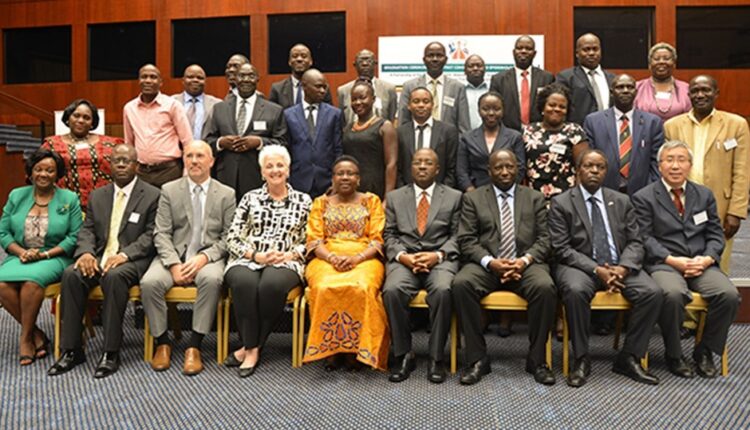1st Cohort of Field Epidemiology Fellows Graduates
Author: Paul Edward Okello-UNIPH
The first cohort of Fellows who enrolled in January 2015 graduated on 2nd Feb 2017. The guest of honor was the Hon. Minister of Health, Dr. Jane Ruth Aceng. In attendance were dignitaries that included HE The US Ambassador, Director General Health Services ,The Principal Makerere College of Health Sciences, Dean MakSPH, CDC Director and WHO Country Rep amongst others.
In her speech, the Hon. Minister thanked everybody who spared their precious time to attend the auspicious occasion of the 1st graduation of Advanced FETP Fellows. She noted that this is an important milestone for Uganda as the country implements the Global Health Security Agenda and moves towards compliance to the International Health regulations. She said her Ministry came up with an initiative to improve disease detection, prevention and response as well as addressing eminent threats which amongst others entails training Field Epidemiologists and other cadres to ensure efficient and effective response to outbreaks.
The Public Health Fellowship Program is a partnership be- tween Ministry of Health and Makerere University School of Public Health (MakSPH) in collaboration with USG through Centres for Control and Prevention (CDC) which aims at cultivating technically competent human resources that can serve as the next generation of public health leaders, she reechoed. She gave a brief history of disease outbreaks in the country and the responses, outlining successes and challenges faced along the control process.

On the training of field epidemiologists and other cadres of Fellows, she noted that this will enable the country address the shortfalls in execution of essential public health functions and in particular reenergise efforts to achieve the following: following (1) reinforce surveillance, laboratory, and health information systems; (2) enhance the communication of health information; (3) strengthen the quality and use of public health data to guide program implementation; (4) improve the quality of investigation and response to acute public health events, and (5) enhance the effectiveness of disease prevention efforts. She pledged the government’s full support for the program.
She congratulated the graduands for dedicating their time and effort to improve health service delivery in the country. I urge you to use the skills you have acquired to make a change in the culture of work in this country, to em- power those below you and also influence those above you so that we can start to see a revolution in the health sector. We will want to see our response to public health needs different. You should be the ambassadors of change wherever you will be absorbed. We pledge to support you to continue the good work you have been trained to do. She concluded amidst applause. She wound up her speech by appreciating the contribution of all the players that have made it possible to address critical areas of improving disease surveillance and controlling epidemics in the recent past. She particularly paid tribute to the USG through Centers for Disease Control and Prevention (CDC), PMI, Global Health Security and the US President’s Plan for AIDS Relief (PEPFAR) for their continued contribution to the success of the Program.
Meanwhile the US Ambassador said the Advanced FETP aims at training Uganda’s next-generation public health leaders on disease investigation, prevention and control, much like how CDC’s Epidemic Intelligence Service (EIS) program trains U.S. disease detectives. In only two years of existence, the program has investigated almost 50 dis- ease outbreaks, assessed health situations in emergency settings and provided evidence based solutions for public health action, which is a remarkable achievement. She concluded by reiterating that the USG support for public health workforce development has been consistent to en- sure that we have capacity to respond to epidemics. One such program that is fully supported by USG through its agency CDC is the Field Epidemiology Training Program.


Comments are closed.